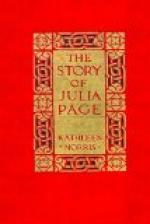“Certainly you did,” Mrs. Chancellor interrupted crisply. “And perhaps she did, too! The details are all the same, you know. Some people make a success of the thing, some people fail. I’ve been married. I’m a little older than you are in years, and ages older in experience—I know all about it. In every marriage there are the elements of success, and in every one the makings of a perfectly justifiable divorce. Some women couldn’t live with a saint who was a king and a Rothschild into the bargain; others marry scamps and are perfectly happy whether they’re being totally ignored or being pulled around by the hair! But if you’ve made a failure, admit it. Don’t sulk. You’ll find that doing something definite about it is like cleaning the poison out of a wound; you’ll feel better! There, now, you’ve had your scolding, and you’ve taken it very nicely. Ring for some hot water, and we’ll talk of something else!”
On just this casual, kindly advice Jim really did go home, prepared to be very dignified with Julia; and to make the separation definite and final, if not legal, or to bring her back, however formally, as his wife, exactly as he saw fit.
And then came the meeting in the Toland library, when in one stunning flash he saw her as she was: beautiful, dignified, and charming, a woman to whom all eyes turned naturally and admiringly, grave, sweet, and wise in a world full of pretence and ignorance, selfishness and shallowness.
She spoke, and her voice went through him like a sword, a mist rose before his eyes. He tried to remember that bitter resentment upon which his pride had fed for more than four long years; he battled with a mad desire to catch her in his arms, and to cry to her and to all the world, “After all, you are still mine!”
He watched her, her beauty as fresh to him as if he had never seen it before. Had those serious eyes, turned to Richie with such sisterly concern, and so exquisitely blue in the soft lamplight, ever met his with love and laughter brightening them? Had the kindly arms that went so quickly about his mother, in her trouble, ever answered the pressure of his own? She could look at him dispassionately, entirely forgetful of herself in the presence of death, but in the very sickroom his eyes could not leave her little kneeling figure; whenever she spoke, he felt his heart contract with a spasm of pain. It seemed to him that if he could kneel before her, and feel the light pressure of her linked hands about his neck, and have her lay that soft, sweet cheek of hers against his, in heavenly token of forgiveness, he would be ready to die of joy.
How far Julia was from this mood he was soon to learn, and no phase of their courtship eight years ago had roused in him such agonies of jealousy and longing as beset him now, when Julia, quiet of pulse and level eyed, convinced him that she could very contentedly exist without him.




